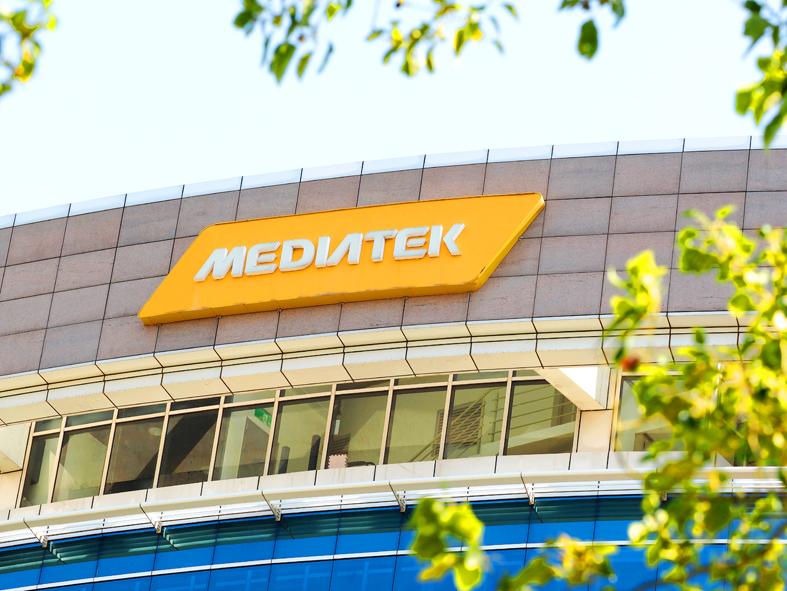Chip designer MediaTek Inc (聯發科) has formed a strategic partnership with Intel Corp to manufacture chips using the US company’s matured process technology as the Taiwanese firm aims to build more resilient and balanced foundry sources, the companies said yesterday.
The agreement will help MediaTek add a new foundry partner with significant capacity in the US and Europe, according to the joint statement said.
“Building on the existing 5G data card venture with Intel, MediaTek is extending the partnership into Intel Foundry Service (IFS) to mature Intel 16 node to support our fast-growing smart edge devices,” MediaTek said in a joint statement.

Photo: David Chang, EPA-EFE
MediaTek said it is to adopt Intel's Intel 16 process node, which is comparable to Taiwan Semiconductor Manufacturing Co's (TSMC, 台積電) 22-nanomter process node, to produce chips used in TVs, routers and other smart-home devices.
“In addition to maintaining a close partnership with TSMC in advanced process nodes, this collaboration [with Intel] will enhance MediaTek’s supply for mature process nodes,” the company said. “We believe this collaboration will help our further market expansion in global smart edge devices”
MediaTek is one of the early adopters of TSMC’s most advanced process technologies such as 4-nanometer and 7-nanometer technologies to build their smartphone chips.
MediaTek is “our long-term customer and we have a strong partnership in advanced technology collaboration. There is no impact on TSMC’s business with MediaTek,” TSMC said of MediaTek’s deal with Intel.
MediaTek has long adopted a multi-sourcing strategy, N.S. Tsai (蔡能賢), corporate senior vice president of the firm’s platform technology and manufacturing operations, said in the statement.
The company already partners with Intel on the 5G data card business, and aims to deepen their collaboration to smart edge devices through IFS, Tsai said.
Intel established IFS last year to help meet rising demand for advanced semiconductor manufacturing capacity. The company recently announced factory expansions at existing sites, as well as plans for major investments in new sites in Ohio and Germany.
“We have the right combination of advanced process technology and geographically diverse capacity to help MediaTek deliver the next billion connected devices across a range of applications,” IFS president Randhir Thakur said in the joint statement.

TAKING STOCK: A Taiwanese cookware firm in Vietnam urged customers to assess inventory or place orders early so shipments can reach the US while tariffs are paused Taiwanese businesses in Vietnam are exploring alternatives after the White House imposed a 46 percent import duty on Vietnamese goods, following US President Donald Trump’s announcement of “reciprocal” tariffs on the US’ trading partners. Lo Shih-liang (羅世良), chairman of Brico Industry Co (裕茂工業), a Taiwanese company that manufactures cast iron cookware and stove components in Vietnam, said that more than 40 percent of his business was tied to the US market, describing the constant US policy shifts as an emotional roller coaster. “I work during the day and stay up all night watching the news. I’ve been following US news until 3am

UNCERTAINTY: Innolux activated a stringent supply chain management mechanism, as it did during the COVID-19 pandemic, to ensure optimal inventory levels for customers Flat-panel display makers AUO Corp (友達) and Innolux Corp (群創) yesterday said that about 12 to 20 percent of their display business is at risk of potential US tariffs and that they would relocate production or shipment destinations to mitigate the levies’ effects. US tariffs would have a direct impact of US$200 million on AUO’s revenue, company chairman Paul Peng (彭雙浪) told reporters on the sidelines of the Touch Taiwan trade show in Taipei yesterday. That would make up about 12 percent of the company’s overall revenue. To cope with the tariff uncertainty, AUO plans to allocate its production to manufacturing facilities in

Six years ago, LVMH’s billionaire CEO Bernard Arnault and US President Donald Trump cut the blue ribbon on a factory in rural Texas that would make designer handbags for Louis Vuitton, one of the world’s best-known luxury brands. However, since the high-profile opening, the factory has faced a host of problems limiting production, 11 former Louis Vuitton employees said. The site has consistently ranked among the worst-performing for Louis Vuitton globally, “significantly” underperforming other facilities, said three former Louis Vuitton workers and a senior industry source, who cited internal rankings shared with staff. The plant’s problems — which have not

COLLABORATION: Given Taiwan’s key position in global supply chains, the US firm is discussing strategies with local partners and clients to deal with global uncertainties Advanced Micro Devices Inc (AMD) yesterday said it is meeting with local ecosystem partners, including Taiwan Semiconductor Manufacturing Co (TSMC, 台積電), to discuss strategies, including long-term manufacturing, to navigate uncertainties such as US tariffs, as Taiwan occupies an important position in global supply chains. AMD chief executive officer Lisa Su (蘇姿丰) told reporters that Taiwan is an important part of the chip designer’s ecosystem and she is discussing with partners and customers in Taiwan to forge strong collaborations on different areas during this critical period. AMD has just become the first artificial-intelligence (AI) server chip customer of TSMC to utilize its advanced